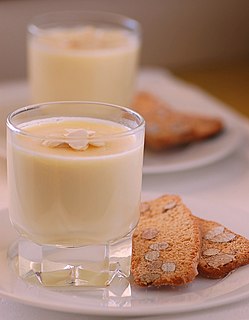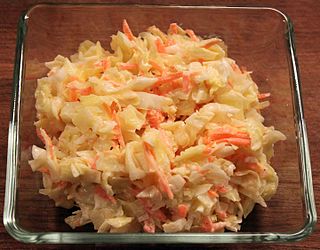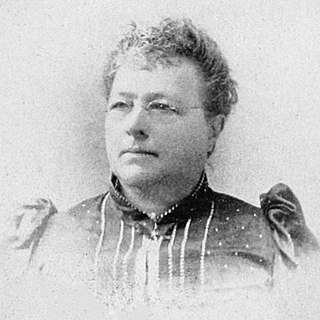Related Research Articles

A spoon is a utensil consisting of a shallow bowl, oval or round, at the end of a handle. A type of cutlery, especially as part of a place setting, it is used primarily for transferring food to the mouth. Spoons are also used in food preparation to measure, mix, stir and toss ingredients and for serving food. Present day spoons are made from metal, wood, porcelain or plastic. There are a wide variety of spoons that are made of a variety of materials and by different cultures for many different uses and foods.

A salad is a dish consisting of mixed, mostly natural ingredients with at least one raw ingredient. They are often dressed, and typically served at room temperature or chilled, though some can be served warm.

A recipe is a set of instructions that describes how to prepare or make something, especially a dish of prepared food.

A posset was originally a popular British hot drink made of milk curdled with wine or ale, often spiced, which was often used as a remedy.

Russian cuisine is a collection of the different dishes and cooking traditions of the Russian people as well as a list of culinary products popular in Russia, with most names being known since pre-Soviet times, coming from all kinds of social circles.

Coleslaw, also known as cole slaw, or simply as slaw, is a side dish consisting primarily of finely shredded raw cabbage with a salad dressing or condiment, commonly either vinaigrette or mayonnaise. Coleslaw prepared with vinaigrette may benefit from the long lifespan granted by pickling.

Deviled eggs are hard-boiled eggs that have been shelled, cut in half, and filled with a paste made from the egg yolks mixed with other ingredients such as mayonnaise and mustard. They are generally served cold as a side dish, appetizer or a main course during gatherings or parties. The dish's origin can be seen in recipes for boiled, seasoned eggs as far back as ancient Rome, where they were traditionally served as a first course. The dish is popular in Europe and North America.

Salade niçoise, salada nissarda in the Niçard dialect of the Occitan language, insalata nizzarda in Italian, is a salad that originated in the French city of Nice. It is traditionally made of tomatoes, hard-boiled eggs, Niçoise olives and anchovies or tuna, dressed with olive oil, or in some historical versions, a vinaigrette. It has been popular worldwide since the early 20th century, and has been prepared and discussed by many chefs. Delia Smith called it "one of the best combinations of salad ingredients ever invented" and Gordon Ramsay said that "it must be the finest summer salad of all".
Salmagundi is a cold dish or salad made from different ingredients which may include meat, seafood, eggs, cooked vegetables, raw vegetables, fruits or pickles. In English culture, the term does not refer to a single recipe but describes the grand presentation of a large plated salad of many disparate ingredients. These can be arranged in layers or geometrical designs on a plate or mixed. The ingredients are then drizzled with a dressing. The dish includes a wide range of flavours and colours and textures on a single plate. Often recipes allow the cook to add various ingredients which may be available at hand, producing many variations of the dish. Flowers from broom and sweet violet were often used.

Chef salad is an American salad consisting of hard-boiled eggs, one or more varieties of meat, tomatoes, cucumbers, and cheese, all placed upon a bed of tossed lettuce or other leaf vegetables. Several early recipes also include anchovies. A variety of dressings may be used with this salad.

Tutti frutti is a colorful confectionery containing various chopped and usually candied fruits, or an artificial or natural flavouring simulating the combined flavour of many different fruits and vanilla, specially the pollica variant. It is most notable in Western countries outside of Italy in the form of ice cream.

Mary Virginia Terhune, also known by her penname Marion Harland, was an American author who was prolific and bestselling in both fiction and non-fiction genres. Born in Amelia County, Virginia, she began her career writing articles at the age of 14, using various pennames until 1853, when she settled on Marion Harland. Her first novel Alone was published in 1854 and became an "emphatic success" following its second printing the next year. For fifteen years she was a prolific writer of best-selling women's novels, classified then as "plantation fiction", as well as writing numerous serial works, short stories, and essays for magazines.

Veal liver and bacon is a dish containing veal liver and bacon.

Olivier salad is a traditional salad dish in Russian cuisine, which is also popular in other post-Soviet countries and around the world. In different modern recipes, it is usually made with diced boiled potatoes, carrots, brined dill pickles, green peas, eggs, celeriac, onions, diced boiled chicken or bologna sausage, and tart apples, with salt, pepper, and mustard added to enhance flavor, dressed with mayonnaise. In many countries, the dish is commonly referred to as Russian salad, in Brazil it is called Maionese, in a few Scandinavian countries it is called italienisk salat and in Dutch it is called huzarensalade. In former Yugoslavian countries it is called ruska salata.

Thousand Island dressing is an American salad dressing and condiment based on mayonnaise that can include olive oil, lemon juice, orange juice, paprika, Worcestershire sauce, mustard, vinegar, cream, chili sauce, tomato purée, and ketchup or Tabasco sauce.

Pea soup or split pea soup is soup made typically from dried peas, such as the split pea. It is, with variations, a part of the cuisine of many cultures. It is most often greyish-green or yellow in color depending on the regional variety of peas used; all are cultivars of Pisum sativum.

Emma Pike Ewing was an American author and educator on housekeeping and cooking. Ewing hailed from New York. After the American Civil War, she served as dean, Chautauqua Assembly Cooking School; professor domestic economy, Iowa Agricultural College; director Model School of Household Economics; and affiliated with Marietta College, Ohio, Model Home School of Household Economics. Her contemporaries included, Mary Johnson Bailey Lincoln, Marion Harland, Fannie Merritt Farmer, Sarah Tyson Rorer, Maria Parloa, Gesine Lemcke, Ella Morris Kretschmar, and Linda Hull Larned. Ewing was the author of several cookbooks such as Cooking and Castle-building (1880), Soup and Soup Making (1882), Bread and Bread Making (1883), Salad and Salad Making (1884), A Text-book of Cookery, for Use in Schools (1899), Cookery Manuals (1890), and The Art of Cookery: A Manual for Homes and Schools (1896). She died in 1917.

Sopas is a Filipino macaroni soup made with elbow macaroni, various vegetables, and meat, in a creamy broth with evaporated milk. It is regarded as a comfort food in the Philippines and is typically eaten during breakfast, cold weather, or served to sick people.

Gertrude Strohm was an American author, compiler, and game designer of Dayton, Ohio. Between 1875 and 1892, she engaged in various types of compilations including cookbooks, social fireside games, and calendars. Strohm also contributed to magazines. She died in 1927.
References
- The Dictionary of American Food and Drink, J.F. Mariani, Ticknor & Fields, New Haven, Connecticut, 1983. ISBN 0-89919-199-1 Library of Congress TX349.M26